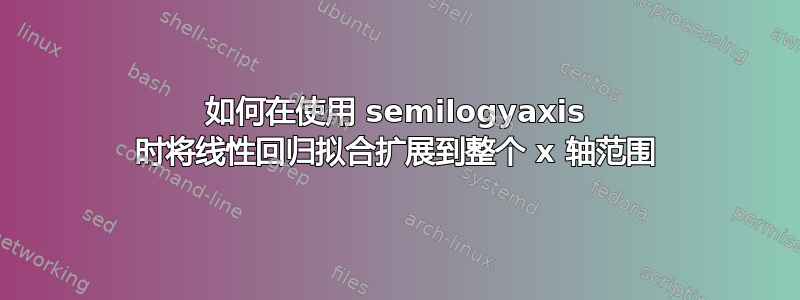
因为我在另一篇文章中被问到:
为了明确地提出这个问题,我现在这样做:
我怎样才能扩展线性回归拟合,例如用以下方式生成(请注意半逻辑轴!!):
\documentclass[fontsize=12pt,openright,oneside,DIV11,a4paper,numbers=noenddot,headsepline,parskip=half]{scrbook}
\usepackage[latin1]{inputenc}
\usepackage[cmex10]{amsmath}
\usepackage{dsfont}
% SIUnitx package
\usepackage{siunitx}
\DeclareSIUnit{\dBm}{dBm}
\usepackage{tikz}
\usepackage{pgfplots}
\usepackage{pgfplotstable}
\pgfplotsset{compat=1.3}
\begin{document}
\begin{tikzpicture}
\begin{semilogyaxis}[
legend style={font=\footnotesize},
legend pos=north east,
legend cell align=left,
/pgf/number format/.cd,
use comma,
xlabel=x,
ylabel=y,
ymin=,
ymax=,
xmin=0,
xmax=10,
]
\addplot+[only marks,color=black, mark=square*,mark options={fill=black}] table[x=x,y=y] {measurement1.txt};
\addlegendentry{measurement1};
% Here I would like to plot the linear regression for the whole x-axis range, not only for the x-values in measurement1.txt
\addplot+[solid,thick,color=black, no marks] table[y={create col/linear regression={y}}] {measurement1.txt};
\addlegendentry{linearregression1};
\end{semilogyaxis}
\end{tikzpicture}
\end{document}
到整个 x 轴范围(例如 0 到 10,而我的测量点范围只有 2 到 8)?它只绘制了测量 1.txt 中数据点的 x 值。是的,我可以使用
\xdef\slope{\pgfplotstableregressiona}
\xdef\yintercept{\pgfplotstableregressionb}
\addplot+[solid,thick,color=black, no marks,domain=0:-10] (x,\slope*x+\yintercept);
但是如果我使用 semilogyaxis,这条线就不再是直线了(当然不是!)。虽然在 axis 环境中生成的线性回归是完美的线性(但没有跨越整个 x 轴范围……)。
答案1
对数变换数据的回归线方程为
Y=exp(b+m*X)
其中m和b分别是斜率和截距。因此,要绘制直线,您应该使用
\addplot {exp(\intercept+\slope*x)};
除了使用addplot命令来确定斜率和截距外,您还可以axis使用 在环境之外进行回归\pgfplotstablecreatecol[linear regression={ymode=log}]{<col name>}{<data table>}。请注意,在这种情况下,您必须明确设置ymode=log。在 中semilogyaxis,这将自动完成。
这是一个完整的例子:

\documentclass{article}
\usepackage{pgfplots, pgfplotstable}
\begin{document}
\pgfplotstableread{
1 2.3
2 3.4
3 9
4 17
5 30
6 70
7 120
8 250
9 650
}\datatable
\pgfplotstablecreatecol[linear regression={ymode=log}]{regression}{\datatable}
\xdef\slope{\pgfplotstableregressiona} % save the slope parameter
\xdef\intercept{\pgfplotstableregressionb} % save the intercept parameter
\begin{tikzpicture}
\begin{axis}[
ymode=log,
xmin=0,xmax=10
]
\addplot [only marks, red] table {\datatable}; % plot the data
\addplot [no markers, domain=0:10] {exp(\intercept+\slope*x)};
\end{axis}
\end{tikzpicture}
\end{document}


